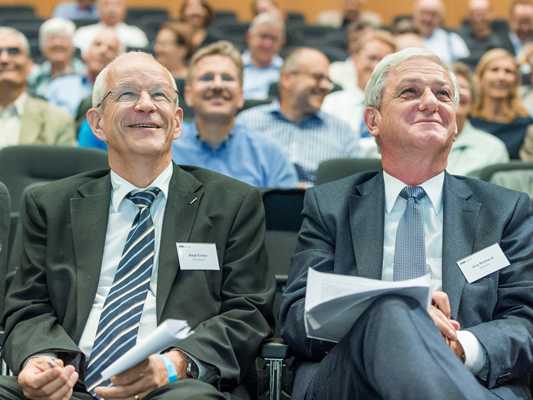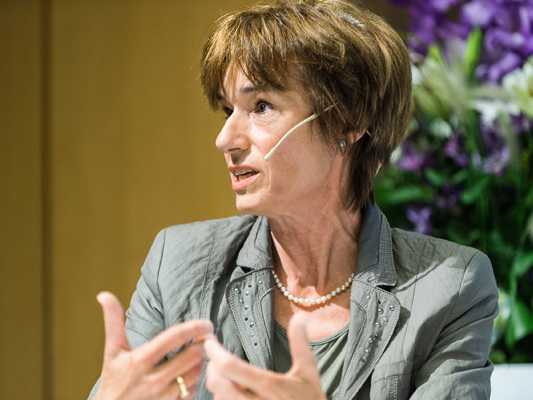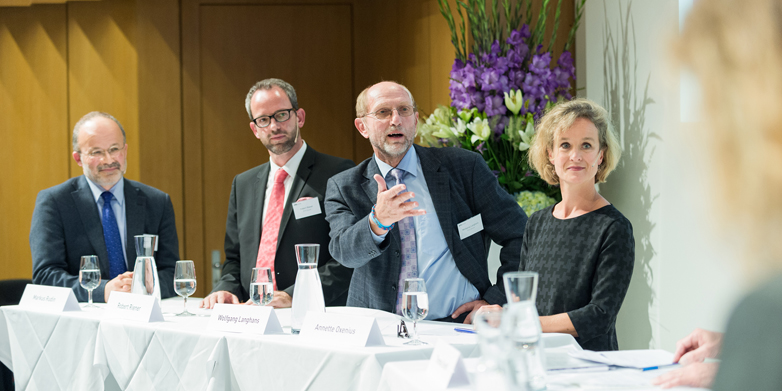An innovative way to combat exploding healthcare costs
At the ETH Health Talk, researchers met with representatives from business, administration and various associations to discuss the Herculean task of making the Swiss healthcare system ready for the future. Participants called for more transparency, more interdisciplinary research and better underlying data.
For the fifth time, ETH Zurich invited the public to attend a discussion on a current socio-political issue. After discussing climate change, energy, water and spatial planning in the past, the Swiss healthcare system came under the spotlight this time round. Around 300 decision-makers from the spheres of business, politics and public administration as well as researchers, students and interested members of the public accepted ETH’s invitation this year.
Today's healthcare challenges are enormous. Thanks to advances in medicine, we are living longer and longer, resulting in a growing percentage of the population requiring the most treatment and exploding healthcare costs. Innovations in the medical sector are therefore urgently needed. ETH Zurich is doing its part through its research at the external pageZentrum Hochschulmedizin Zürich (HMZ)call_made in collaboration with the two partners, namely the University of Zurich and University Hospital Zurich. In addition, the new Health Sciences and Technology study program was introduced in 2011. Over 800 students have enrolled so far.
Overeating and too little exercise
During the first part of the event, researchers from ETH Zurich and Hochschulmedizin Zurich presented the latest research findings in the fields of prevention, diagnostics and therapy. Wolfgang Langhans, a professor of physiology and behaviour, opened the discussion with a figure reflecting the ugly reality of the costs involved: in 2001, obesity in Switzerland directly and indirectly cost the Swiss population CHF2 billion; in 2006, the figure had already reached CHF 5.8 billion. According to Langhans, the reasons behind the increase in chronic diseases such as type 2 diabetes and obesity-related diseases were identified quickly: “We eat too much and don't exercise enough.” He therefore called for prevention over having to deal with an explosion in costs. The results from other interdisciplinary research projects conducted at ETH Zurich have shown that a minor change in habits alone, such as providing smaller portions and offering a larger selection of vegetables in canteens, would have a significant positive effect.
Markus Rudin, a professor of molecular imaging and functional pharmacology, went on to discuss the latest developments in diagnostics, specifically imaging methods such as magnetic resonance tomography (MRT). Rudin explained how several teams at Hochschulmedizin Zurich are primarily working to make the imaging technology faster, more sensitive, more precise and more “biological”. With regard to the latter, he is referring to the translation of results from engineering into medical language. The experts agreed that this is one of the greatest challenges currently encountered as the engineering sciences and medicine increasingly converge.
New antibiotics and therapy robots
Professor of immunology Annette Oxenius gave a presentation illustrating how antibiotics and vaccinations could be improved. She also discussed their associated risks. On the one hand, antibiotics and antiviral medications are celebrated as a success story in the treatment of many infectious diseases. On the other hand, the development of resistances is increasingly threatening these successes, and new pathogens such as SARS and rapidly mutating pathogens like the influenza viruses that change each year are constantly increasing the costs involved in the development of effective vaccines. Various work groups at the Institute of Microbiology at ETH Zurich are therefore looking for new and efficient drugs such as a general influenza vaccine that responds to all influenza viruses. In doing so, a new vaccine will not have to be developed again every year.
Finally, Robert Riener, a professor of sensory motor systems, presented a richly illustrated survey of how robots are currently used for therapeutic applications such as helping partially paralyzed patients learn how to move their arms or legs again after suffering a stroke. According to Riener, hospital patients today spend approximately 90 percent of their time in bed, although movement is essential to their recovery. This is where robots should be able to step in and provide relief when there are staff shortages. Combining them with interactive computer games also adds an element of fun to the exercises.
Innovations without increasing costs
In his opening speech for the second part of the event, ETH president Ralph Eichler called for pairing engineer-like thinking with medical knowledge. “Without process innovations in healthcare, we may no longer be able to afford product innovations in the near future,” he stated. Innovation without an increase in costs for the products must therefore be the aim of the medical sector, as has been the case with computers for a long time.
In two panel discussions yesterday, representatives from health insurance companies, the pharmaceutical industry, the federal government, patient and consumer protection organizations and research critically discussed the role of science in a sustainable Swiss healthcare system. One frequently mentioned concern was the independence and transparency of scientific findings. Prisca Birrer-Heimo, National Councillor and President of the Stiftung für Konsumentenschutz (Consumer Protection Foundation), was adamant that medical researchers must always remain credible in the eyes of patients. The closeness of universities and industry when, for example, it comes to funding professorships threatens to undermine trust in science.
More “holistic approaches” and interdisciplinary research in medicine were called for as well. Jörg Reinhardt, Chair of the Board at Novartis, as well as Gregor Zünd, Director of Research and Teaching at University Hospital Zurich, were also in favour of this. For both men, close collaboration between research and industry is an important basis for ensuring a sustainable healthcare system. Tanja Krones from the Clinical Ethics Committee at University Hospital Zurich urged that the social sciences should also be more closely involved in research projects from an earlier stage. Barbara Züst from Stiftung Patientenschutz (Patient Protection Foundation) stressed that to make the healthcare system more efficient, it is not just medical knowledge which is required; knowledge from the fields of sociology, ethics and economics is also imperative. Many of the attendees also called for the quality of the underlying data that might be used to reform the healthcare system to be improved. Verena Nold, Director of Santésuisse and National Councillor Ruth Humbel agreed that there is great potential for improving our healthcare system. Both spoke vehemently in favour of electronic patient files. However, they also drew attention to the difficulty of realising this in a political context along with the fears of patients and doctors.
Impressions of the ETH Health Talk
-

ETH President Ralph Eichler and Novartis Chairman of the Board Jörg Reinhardt enjoying the conversation on healthcare. (Photo: Frank Brüderli / ETH Zurich) -

Ruth Humbel, National Councillor and member of the Commission on Social Security and Health, spoke vehemently in favour of electronic patient files. (Photo: Frank Brüderli / ETH Zurich) -

Jörg Reinhardt, Chairman of the Board at Novartis AG, takes part in the panel discussion. (Photo: Frank Brüderli / ETH Zurich)
A call for “patient care research”
Oliver Peters, Deputy Director of the Federal Office of Public Health, explained how better data and a standardized registry are also part of the federal government's Health 2020 strategy. He also stated that more knowledge about coordination between hospitals, doctors and health insurers is needed. For example, we know too little about outpatient treatments or the economic and health consequences of relocating patients. According to Peters, “patient care research” is required in this regard. This would provide a basis for standardizing processes and increasing efficiency and savings without having to compromise patient care.
The participants of the panel discussion agreed that the dialogue between all healthcare players must continue and be intensified. Only in this way will it be possible to ensure that innovation continues to benefit patients and that we do not lose sight of its relation to financial feasibility. The ETH Zurich Health Talk were therefore an important first step in this process.
Pictures and presentations from the Health Talks 2014
All presentations given by researchers are available on the ETH Health Talk website. A video recording of the event and a picture gallery with impressions of the event is also available.


